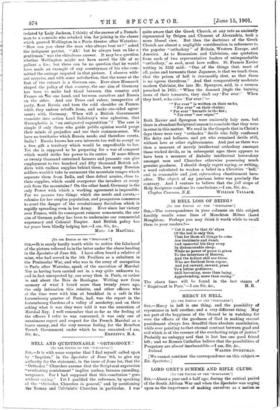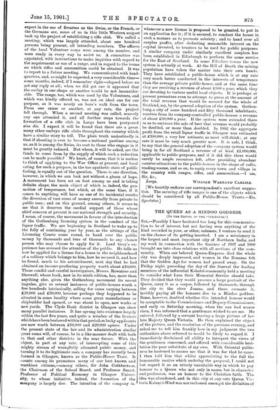LORD GREY'S SCHEME AND RIFLE CLUBS.
[TO THE EDITOR OF THE "SPECTATOR."]
Srn,—About a year and a half ago, during the critical period of the South African War and when the Spectator was urging upon us the importance of making ourselves as a nation as expert in the use of firearms as the Swiss, or the French, or the Germans are, some of us in this little Western seaport took up the project of establishing a rifle club. We called a meeting, which was largely attended, about one hundred persons being present, all intending members. The officers of the local Volunteer corps were among the number, and were ready in every way to assist us. A committee was appointed, with instructions to make inquiries with regard to the acquirement or use of a range, and in regard to the terms on which rifles and ammunition could be obtained. It was to report to a future meeting. We communicated with head- quarters, and, as might be expected, a very considerable time— some months, indeed, if I remember right—elapsed before we got any reply at all; when we did get one it appeared that the outlay in one shape or another would be not inconsider- able. The range, too, which was used by the Volunteers, and which was kindly offered us, was not an ideal one for our purpose, as it was nearly an hour's walk from the town. From one cause or another, at any rate, the project fell through. When a second meeting was called, scarcely any one attended it, and all further steps towards the formation of a rifle club in Largs have been postponed sine die. I expect it will be found that there are a great many other embryo rifle clubs throughout the country which have a similar story to tell. The plain truth undoubtedly is that if shooting is ever to become a national pastime among us, as it is among the Swiss, its cost to those who engage in it must be greatly reduced. But where, it will be asked, are the funds to come from by the supply of which such a reduction can be made possible? We know, of course, that it is useless to think of applying to the War Office at present, and local rating for such a purpose, in the too apathetic state of public feeling, is equally out of the question. There is one direction, however, in which we can look not without a gleam of hope. A movement has been set on foot among us and is taking definite shape, the main object of which is, indeed, the pro- motion of temperance, but which, at the same time, if it comes to anything, will have as one of its incidental results the diversion of vast sums of money annually from private to public uses; and on this ground, among others, it seems to me that it deserves the cordial support of those whose chief concern at present is our national strength and security. I mean, of course, the movement in favour of the introduction of the Gothenburg licensing system in the conduct of the liquor traffic. We are beginning in Scotland to wake up to the folly of continuing year by year, as the sittings of the Licensing Courts come round, to hand over the public money by thousands and tens of thousands to any chance person who may choose to apply for it. Lord Grey's ex- perience has aroused the attention of the public. He tells us how he applied for a license for a house in the neighbourhood of a colliery which belongs to him, how he secured it, and how he found, much to his astonishment, next day that he had obtained an income-producing property worth about £10,000. Those candid and careful investigators, Messrs. Rowntree and Sherwell, whose book, now in its ninth edition, has, more than anything else, given the Gothenburg movement its recent impulse, give us several instances of public-houses worth a. few hundreds intrinsically, selling for sums varying between £20,000 and £30,000, because perhaps they happened to be situated in some locality where some great manufacturer or shipbuilder had opened, or was about to open, new works or new yards. The Clyde Bank district in Glasgow can show many parallel instances. It has sprung into existence largely within the last five years, and quite a number of the licenses which have been bestowed within that period on lucky applicants are now worth between £10,000 and 220,000 apiece. Under the present state of the law and its administration similar great sums will, of course, be in a like manner dealt with both in that and other districts in the near future. With the object, in part at any rate, of intercepting some of this mighty stream of wrongfully alienated public money, and turning it to its legitimate uses, a company has recently been formed in Glasgow, known as the Public-House Trust. It counts among its promoters many of our best known and worthiest citizens,—among others, Sir John Cuthbertson, the Chairman of the School Board, and Professor Smart, Professor of Political Economy in Glasgow Univer- sity, to whose initiative, indeed, the formation of the company is largely due. The intention of the company is, whenever a new license is proposed to be granted, to put in an application for it ; if it is secured, to conduct the house in such a manner as to promote sobriety; and to band over all surplus profits, after deducting reasonable interest on the capital invested, to trustees to be used for public purposes. A similar company under similarly excellent auspices has been established in Edinburgh to perform the same service for the East of Scotland. In some Fifeshire towns the new system is actually at work. At the Hill of Beath the mining population have taken the matter into their own bands. They have established a public-house which is at any rate very much better conducted in the interests of temperance than the average private public-house, and at the same time they are receiving a revenue of about 2500 a year, which they are devoting to various useful local objects. It is perhaps at present premature even to attempt to guess at the amount of the total revenue that would be secured for the whole of Scotland, say, by the general adoption of the system. Gothen- burg, a city of some hundred and fifty thousand inhabitants, receives from its company-controlled public-houses a revenue of about £30,000 a year. If the system were extended there so as to embrace the sale of beer that revenue would probably be doubled, or more than doubled. In 1892 the aggregate profit from the retail liquor traffic in Glasgow was estimated at £300,000, a very low estimate, as most will think ; at any rate it must be very much greater now. It is safe, I think, to say that the general adoption of the company system would bring in for all Scotland a revenue of at least £1,000,000, applicable to public purposes, and if it did this there would surely be ample resources left, after providing abundant counter-attractions to the public-houses in the shape of cafés, reading-rooms, and so on, to equip every town and village in the country with ranges, rifles, and ammunition.—I am, Sir, &c., Largo. WILLIAM WARRAND CARLILE.
[We heartily endorse our correspondent's excellent sugges- tion. The securing of rifle ranges is one of the objects which should be considered by all Public-House Trusts.—En. Spectator.]











































 Previous page
Previous page